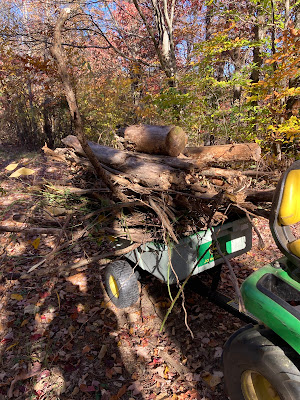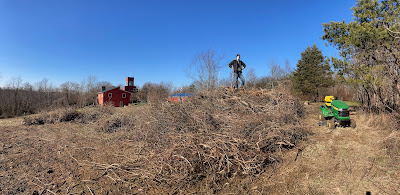On November 4, after days of work, my little Deere X300 crapped out on me. It kept surging and cutting off, something it's done before. The two times it happened before, there was a stinkbug in the gas tank. This didn't feel quite like that. It was too predictable. It would happen on startup, when the engine was cold, and then it would calm down. The surging would start again when the engine was hot and I was going uphill with a load.
One thing for sure: I was very bummed to have my best mate back in the shop. I'd only gotten it back in June from another gas tank cleanout, at tremendous expense, including a $200 pickup and delivery fee!
David and Laura, my incredible naturalist/photographer/videographer friends and neighbors, to the rescue! They brought their big pickup and trailer. First we threw my last five loads from the oil road onto their trailer and hauled it to the brushpile.
We threw the brush on the pile. In about a half hour, David and Laura did another full day's work for me. It sure helps to have the right gear, in this case a trailer that would take all the brush at once.

Then, we loaded the tractor onto the trailer.
I can't even tell you how wonderful it was to have such great help, and to not have to throw another $200 down the well for transport. I followed the truck into town to arrange the repair.
I asked the repair shop to change the oil while it was in and they assured me they would.
I got it back in a couple days; they said the diaphragm in the fuel pump was bad, so they replaced the whole pump. Sounded reasonable, cost $145...I've never been so happy to pay that kind of money. Could it really have been that simple? No. It was even simpler.
Dave and Laura went back and picked it up for me, and when I started it, it surged and killed exactly as it had when I sent it in. Now I was MAD. Had the shop tested their work? Apparently not. And they hadn't fixed the problem. @#$@#$#$%#$!!!!
Since it was a predictable problem, I was able to sneak in a couple more loads from around the oilwell before the tractor acted up and died on me again.
Well, at least I was done with the oil road, and I managed to clear the mess behind the oilwell that had obstructed my favorite Loop trailhead. Mow Day, Nov. 9, was almost upon me. I'd deal with the sick tractor later.
Curtis and I were plumb worn out. But there was one more huge day to go.
It's just stunning the growth that takes place over one season. The place is totally transformed by tall heads of goldenrod and shining sumac poking up through it. I like to leave all that until it loses the last bit of life and color. Then I'm ready to see it go, whether we've had frost or not (not yet, as of Nov. 12.)
I charged the big Massey 135's battery for several hours the night before Walter, Timmy and Kevin arrived. It didn't take them too long to get it roaring and going on the big job. Kevin loves to run my red tractor, he says it's a nice little machine. And he goes allll day long on that thing. He's incredibly good at nosing it and backing it into nooks of invasive vegetation and mowing it all down. He's got a sixth sense for where I'd like him to mow, and walking through the orchard and along the meadow borders is always such a delight after Kevin's been through.
While Kevin was mowing, I asked Walter and Timmy to give a listen to my John Deere. I started it up and yes, the constant surging and eventual sputtering out was happening still.
They checked hoses and wires and fiddled with choke and throttle and finally Walter said, "You know, these John Deere's have a sensor that'll shut 'em down when they get too low on oil. Let's check the oil."
"Good idea, " I replied, having had NO idea such a sensor existed. "But I asked the shop to change the oil so it should be full."
Well. The shop hadn't changed the oil, and it was very low. Holy cow. Could it have been as simple as that? All this time, just low on oil? No bug in the tank, no busted fuel pump, just low on oil?
Walter put about half a quart in and started it back up. It surged a bit, and we ran it for awhile, then shut it down. The next time I started it, it ran like a top. I think...we...figured..it out. Time will tell.
What would I do without my friends?
I sure couldn't make it alone out here.
I sure couldn't make it alone out here.
Here's how the meadow looked after Kevin got done with it. Willya look at that brushpile though?
Here, I have to divert a bit and perhaps explain myself to some who may not grasp what I'm dealing with on these 80 acres. Every time I post a photo of one of my brushpiles (and they have been legion since I got serious about cleaning this place up in 2019), I get comments from people who ask why I don't just "leave the brushpiles to rot." Why do I burn the brushpiles? Why don't I want to sequester carbon and give habitat to the wildlife?
Why would I want to burn a brushpile?
Because this is not the only brushpile I've made. Since 2019, I've probably made ten or more of these enormous piles of invasive vegetation. Here's a little review of piles I made just in 2021.
Dec. 27, 2021
April 3, 2021. Autumn olive, just leafing out, cut from the driveway. It's easy to spot and cut when it's leafing out, before any native plants awaken. Well, it's not easy to cut. It's thorny and horrible. Not something I want to look at for years, thank you.
I'm cutting invasives all through the fall, winter and early spring, just trying to reclaim this place from the disgusting tangle of vegetative trash (Japanese honeysuckle, autumn olive, Amur honeysuckle, and multiflora rose) that it had become by the time Bill died in 2019.
So, tell me. How would my sanctuary look if I "just left the brushpile to rot" times a dozen? How would the meadow look, dotted with piles of brush that then become multiflora rose, Japanese honeysuckle and Asian bunchgrass nurseries? What is in those piles you do not want to re-seed, re-sprout, re-spread!
Y'all are free to leave your personal brushpiles to rot. I'm going to doubt they are far taller than your head, and I also doubt that you make several such mountainous piles every season. I am not sure that those who question what I'm up to here fully grasp the volume of brush we're talking about. This 80 acres is an invasive vegetation factory, and it runs day and night. The gears are always turning, the conveyer belts always bringing more loads of the plants I don't want. In the last two days I've found two new invasives on the place: Callery pear, lollipop tree beloved by developers, now scourge of the highway shoulders (AAACK) and privet. They die!
I am always fighting for space and light for the useful and beautiful natives that belong here: dogwood, spicebush, tulip trees, nannyberry, sassafras, persimmon, pawpaw, oaks, hickories, black, red and sugar maples, to name just a few of the trees I cut around. These are the trees I free from being smothered. These are the neighbors I want. And this is why I burn.
Third and final installment coming soon!












No comments:
Post a Comment